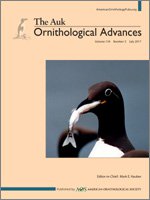Avian brood parasitism provides a tractable system within which to study diverse aspects of animal ecology and evolution. Yet, parasite–host research has focused on specific adaptations and counter-adaptations, such as egg rejection by hosts and egg mimicry by parasites, leaving other aspects of these relationships poorly studied, including general life history traits of hosts that did not evolve as specific antiparasite defenses. In particular, the diet and fledging parameters (age, mass, success) of parasitic nestlings are poorly known, although they are central to our understanding of host selection and the potential for coevolution in parasite–host relationships. We focused on the diet composition and fledging parameters of parasitic Common Cuckoo (Cuculus canorus) nestlings raised by their only regular cavity-nesting host, the Common Redstart (Phoenicurus phoenicurus). In addition to invertebrates, both Common Cuckoo and Common Redstart nestlings were fed fruits and lizards by some host pairs. This is the first record of lizards being fed to Common Cuckoo nestlings by any host. Capitalizing on this unusual diet and between-host-pair variation (statistically confirmed by high repeatability of diet composition across host pairs), we tested for the first time whether nestling diet variation affected Common Cuckoo breeding success. Common Cuckoos, but not Common Redstarts, fed a combination of plants and vertebrates showed decreased fledging masses and delayed fledging. Common Cuckoos fed with plants (but not vertebrates) also had lower fledging masses. Vertebrates alone did not have any effects. Fledging success was not influenced. These patterns could not be explained by various potential confounding effects, including seasonal effects or inferior provisioning capacities of Common Redstarts feeding unusual diets. This suggests that plant and vertebrate material is digestible by Common Cuckoo nestlings but might cause ontogenetic stress. We show for the first time that diet composition may affect parasite success, not only at the level of host species, as documented by previous studies, but also intraspecifically (i.e. at the level of individual host pairs). Host diet selection may represent an important general life history trait that affects brood parasite fitness, even though it most likely did not evolve as a specific antiparasite defense.
How to translate text using browser tools
28 June 2017
Unusual diet of brood parasitic nestlings and its fitness consequences
Tomáš Grim,
Zdeněk Tyller,
Peter Samaš

The Auk
Vol. 134 • No. 3
July 2017
Vol. 134 • No. 3
July 2017
Common Cuckoo
Common Redstart
diet
fitness
fledging success
host selection




